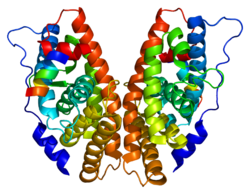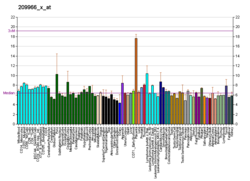Estrogen-related receptor gamma (ERR-gamma), also known as NR3B3 (nuclear receptor subfamily 3, group B, member 3), is a nuclear receptor that in humans is encoded by the ESRRG (EStrogen Related Receptor Gamma) gene.[5][6][7] It behaves as a constitutive activator of transcription.[8]
This protein is a member of nuclear hormone receptor family of steroid hormone receptors. No physiological activating ligand is known for this orphan receptor, but 4-hydroxytamoxifen and diethylstilbestrol act as inverse agonists and deactivate ESRRG.[9] It also seems to be the target of bisphenol A (see below).
Bisphenol A binding
editThere is evidence that bisphenol A functions as a xenoestrogen by binding strongly to ERR-γ.[8] BPA as well as its nitrated and chlorinated metabolites seems to binds strongly to ERR-γ (dissociation constant = 5.5 nM), but not to the estrogen receptor (ER).,[8][10] BPA binding to ERR-γ preserves its basal constitutive activity.[8] It can also protect it from deactivation from the selective estrogen receptor modulator 4-hydroxytamoxifen.[8]
Different expression of ERR-γ in different parts of the body may account for variations in bisphenol A effects. For instance, ERR-γ has been found in high concentration in the placenta, explaining reports of high bisphenol A accumulation there.[11]
References
edit- ^ a b c GRCh38: Ensembl release 89: ENSG00000196482 – Ensembl, May 2017
- ^ a b c GRCm38: Ensembl release 89: ENSMUSG00000026610 – Ensembl, May 2017
- ^ "Human PubMed Reference:". National Center for Biotechnology Information, U.S. National Library of Medicine.
- ^ "Mouse PubMed Reference:". National Center for Biotechnology Information, U.S. National Library of Medicine.
- ^ "Entrez Gene: ESRRG estrogen-related receptor gamma".
- ^ Eudy JD, Yao S, Weston MD, Ma-Edmonds M, Talmadge CB, Cheng JJ, Kimberling WJ, Sumegi J (Jun 1998). "Isolation of a gene encoding a novel member of the nuclear receptor superfamily from the critical region of Usher syndrome type IIa at 1q41". Genomics. 50 (3): 382–4. doi:10.1006/geno.1998.5345. PMID 9676434.
- ^ Chen F, Zhang Q, McDonald T, Davidoff MJ, Bailey W, Bai C, Liu Q, Caskey CT (Mar 1999). "Identification of two hERR2-related novel nuclear receptors utilizing bioinformatics and inverse PCR". Gene. 228 (1–2): 101–9. doi:10.1016/S0378-1119(98)00619-2. PMID 10072763.
- ^ a b c d e Matsushima A, Kakuta Y, Teramoto T, Koshiba T, Liu X, Okada H, Tokunaga T, Kawabata S, Kimura M, Shimohigashi Y (Oct 2007). "Structural evidence for endocrine disruptor bisphenol A binding to human nuclear receptor ERR gamma". Journal of Biochemistry. 142 (4): 517–24. doi:10.1093/jb/mvm158. PMID 17761695.
- ^ Huppunen J, Aarnisalo P (Feb 2004). "Dimerization modulates the activity of the orphan nuclear receptor ERRgamma". Biochemical and Biophysical Research Communications. 314 (4): 964–70. doi:10.1016/j.bbrc.2003.12.194. PMID 14751226.
- ^ Babu S, Vellore NA, Kasibotla AV, Dwayne HJ, Stubblefield MA, Uppu RM (Sep 2012). "Molecular docking of bisphenol A and its nitrated and chlorinated metabolites onto human estrogen-related receptor-gamma". Biochemical and Biophysical Research Communications. 426 (2): 215–20. doi:10.1016/j.bbrc.2012.08.065. PMID 22935422.
- ^ Takeda Y, Liu X, Sumiyoshi M, Matsushima A, Shimohigashi M, Shimohigashi Y (Jul 2009). "Placenta expressing the greatest quantity of bisphenol A receptor ERR{gamma} among the human reproductive tissues: Predominant expression of type-1 ERRgamma isoform". Journal of Biochemistry. 146 (1): 113–22. doi:10.1093/jb/mvp049. PMID 19304792.
Further reading
edit- Bonaldo MF, Lennon G, Soares MB (Sep 1996). "Normalization and subtraction: two approaches to facilitate gene discovery". Genome Research. 6 (9): 791–806. doi:10.1101/gr.6.9.791. PMID 8889548.
- Nagase T, Ishikawa K, Suyama M, Kikuno R, Hirosawa M, Miyajima N, Tanaka A, Kotani H, Nomura N, Ohara O (Dec 1998). "Prediction of the coding sequences of unidentified human genes. XII. The complete sequences of 100 new cDNA clones from brain which code for large proteins in vitro". DNA Research. 5 (6): 355–64. doi:10.1093/dnares/5.6.355. PMID 10048485.
- Hong H, Yang L, Stallcup MR (Aug 1999). "Hormone-independent transcriptional activation and coactivator binding by novel orphan nuclear receptor ERR3". The Journal of Biological Chemistry. 274 (32): 22618–26. doi:10.1074/jbc.274.32.22618. PMID 10428842.
- Heard DJ, Norby PL, Holloway J, Vissing H (Mar 2000). "Human ERRgamma, a third member of the estrogen receptor-related receptor (ERR) subfamily of orphan nuclear receptors: tissue-specific isoforms are expressed during development and in the adult". Molecular Endocrinology. 14 (3): 382–92. doi:10.1210/mend.14.3.0431. PMID 10707956.
- Greschik H, Wurtz JM, Sanglier S, Bourguet W, van Dorsselaer A, Moras D, Renaud JP (Feb 2002). "Structural and functional evidence for ligand-independent transcriptional activation by the estrogen-related receptor 3". Molecular Cell. 9 (2): 303–13. doi:10.1016/S1097-2765(02)00444-6. PMID 11864604.
- Wistow G, Bernstein SL, Wyatt MK, Fariss RN, Behal A, Touchman JW, Bouffard G, Smith D, Peterson K (Jun 2002). "Expressed sequence tag analysis of human RPE/choroid for the NEIBank Project: over 6000 non-redundant transcripts, novel genes and splice variants". Molecular Vision. 8: 205–20. PMID 12107410.
- Hentschke M, Süsens U, Borgmeyer U (Aug 2002). "Domains of ERRgamma that mediate homodimerization and interaction with factors stimulating DNA binding". European Journal of Biochemistry. 269 (16): 4086–97. doi:10.1046/j.1432-1033.2002.03102.x. PMID 12180985.
- Hentschke M, Süsens U, Borgmeyer U (Dec 2002). "PGC-1 and PERC, coactivators of the estrogen receptor-related receptor gamma". Biochemical and Biophysical Research Communications. 299 (5): 872–9. doi:10.1016/S0006-291X(02)02753-5. PMID 12470660.
- Hentschke M, Schulze C, Süsens U, Borgmeyer U (Mar 2003). "Characterization of calmodulin binding to the orphan nuclear receptor Errgamma". Biological Chemistry. 384 (3): 473–82. doi:10.1515/BC.2003.053. PMID 12715898. S2CID 41163978.
- Hentschke M, Borgmeyer U (Dec 2003). "Identification of PNRC2 and TLE1 as activation function-1 cofactors of the orphan nuclear receptor ERRgamma". Biochemical and Biophysical Research Communications. 312 (4): 975–82. doi:10.1016/j.bbrc.2003.11.025. PMID 14651967.
- Cheung CP, Yu S, Wong KB, Chan LW, Lai FM, Wang X, Suetsugi M, Chen S, Chan FL (Mar 2005). "Expression and functional study of estrogen receptor-related receptors in human prostatic cells and tissues". The Journal of Clinical Endocrinology and Metabolism. 90 (3): 1830–44. doi:10.1210/jc.2004-1421. PMID 15598686.
- Liu D, Zhang Z, Teng CT (Apr 2005). "Estrogen-related receptor-gamma and peroxisome proliferator-activated receptor-gamma coactivator-1alpha regulate estrogen-related receptor-alpha gene expression via a conserved multi-hormone response element". Journal of Molecular Endocrinology. 34 (2): 473–87. doi:10.1677/jme.1.01586. PMID 15821111.
- Gao M, Sun P, Wang J, Zhao D, Wei L (2006). "Expression of estrogen receptor-related receptor isoforms and clinical significance in endometrial adenocarcinoma". International Journal of Gynecological Cancer. 16 (2): 827–33. doi:10.1111/j.1525-1438.2006.00527.x. PMID 16681769. S2CID 37213476.
- Wang L, Zuercher WJ, Consler TG, Lambert MH, Miller AB, Orband-Miller LA, McKee DD, Willson TM, Nolte RT (Dec 2006). "X-ray crystal structures of the estrogen-related receptor-gamma ligand binding domain in three functional states reveal the molecular basis of small molecule regulation". The Journal of Biological Chemistry. 281 (49): 37773–81. doi:10.1074/jbc.M608410200. PMID 16990259.
- Babu S, Vellore NA, Kasibotla AV, Dwayne HJ, Stubblefield MA, Uppu RM (Sep 2012). "Molecular docking of bisphenol A and its nitrated and chlorinated metabolites onto human estrogen-related receptor-gamma". Biochemical and Biophysical Research Communications. 426 (2): 215–20. doi:10.1016/j.bbrc.2012.08.065. PMID 22935422.






